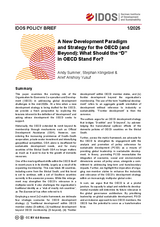Policy Brief
A new development paradigm and strategy for the OECD (and beyond): what should the ‘D’ of OECD stand for?
Sumner, Andy / Stephan Klingebiel / Arief Anshory YusufPolicy Brief (1/2025)
Bonn: German Institute of Development and Sustainability (IDOS)
DOI: https://doi.org/10.23661/ipb1.2025
This paper examines the evolving role of the Organisation for Economic Co-operation and Development (OECD) in addressing global development challenges in the mid-2020s. At a time when a new development strategy is being drafted for the OECD, we provide a fresh perspective by exploring the tensions inherent in the definition of “development” and asking whose development the OECD seeks to support.
Historically, the OECD extended its remit beyond its membership through mechanisms such as Official Development Assistance (ODA). However, considering the increasing prominence of South–South cooperation, private sector investment and intensifying geopolitical competition, ODA alone is insufficient for sustainable development needs, and for many countries of the Global South ODA no longer matters as much as it used to due to the growth of domestic resources.
One of the most significant shifts within the OECD itself in recent years is in its identity, largely as a result of its expanding membership. This now totals 38 countries, including some from the Global South, and this trend is set to continue, with a set of Southern countries currently in the accession process. While this enlargement may strengthen the OECD’s relevance in a multipolar world, it also challenges the organisation’s traditional identity as a “club of mostly rich countries”, as The Economist has often referred to it.
Employing a novel 2x2 matrix framework, we delineate four strategic scenarios for OECD development strategy: (i) “traditional development” within OECD member states (D-within), (ii) traditional development beyond OECD membership (D-beyond), (iii) “frontier development” within OECD member states, and (iv) frontier development beyond the organisation’s membership. The use of the term “traditional development” refers to an aggregate growth orientation of development without reference to inclusivity or sustainability. “Frontier development” is then the converse. The authors argue for an OECD development strategy that bridges “D-within” and “D-beyond”, by acknowledging the transnational spillover effects of the domestic policies of OECD countries on the Global South. Further, across the matrix framework, we advocate for the OECD to strengthen its engagement with the analysis and promotion of policy coherence for sustainable development (PCSD) as a means of providing global leadership in sustainable development. In theory, promoting PCSD necessitates the integration of economic, social and environmental dimensions across all policy areas, alongside a commitment to addressing long-term and transboundary impacts. Further, we highlight the imperative of engaging non-member states to enhance the inclusivity and relevance of the OECD’s development strategy within an increasingly multipolar global order.
In sum, we argue that the OECD is at a pivotal juncture. Its capacity to adapt and redefine its developmental mandate will determine its future relevance in the global governance architecture. By prioritising leadership on global sustainable development, PSCD and an inclusive approach to non-OECD members, the OECD has the potential to serve as a transformative force.
Professor Andy Sumner is Professor of International Development at King’s College in London and President of the European Association of Development Research and Training Institutes.
Professor Arief Anshory Yusuf is a Professor of Economics at the Department of Economics in Padjadjaran University, Indonesia. He is also a Senior Researcher and Director Founder of Sustainable Development Goals Center of Universitas Padjadjaran.
Contact
Cornelia Hornschild
Publication Coordinator
E-mail Cornelia.Hornschild@idos-research.de
Phone +49 (0)228 94927-135
Fax +49 (0)228 94927-130
Alexandra Fante
Librarian/ Open Access Coordinator
E-Mail Alexandra.Fante@idos-research.de
Telefon +49 (0)228 94927-321
Fax +49 (0)228 94927-130




![[Translate to English:] Photo: Alexandra Fante, Bibliothekarin/Open Access-Koordinatorin](/fileadmin/_processed_/f/0/csm__c_Deutsches-Institut-fuer-Entwicklungspolitik_Fante_94ce4fa1ba.jpg)